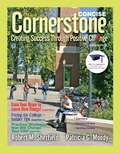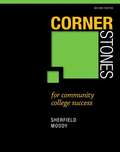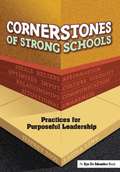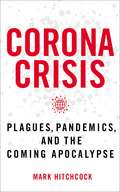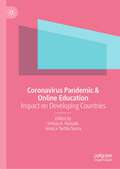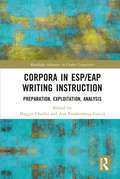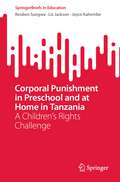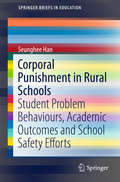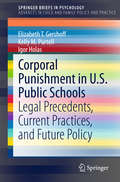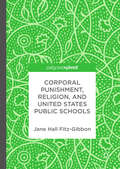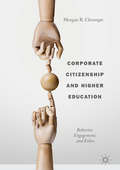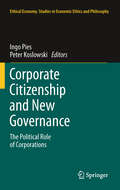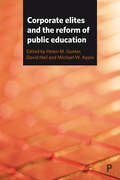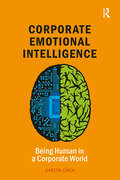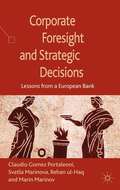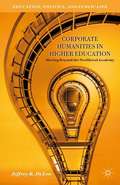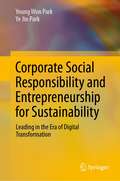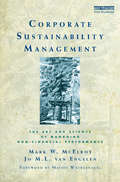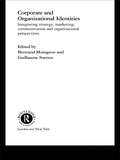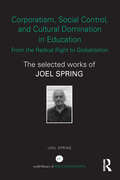- Table View
- List View
Cornell, A History, 1940-2015: A History, 1940–2015
by Isaac Kramnick Glenn C. AltschulerIn their history of Cornell since 1940, Glenn C. Altschuler and Isaac Kramnick examine the institution in the context of the emergence of the modern research university. The book examines Cornell during the Cold War, the civil rights movement, Vietnam, antiapartheid protests, the ups and downs of varsity athletics, the women's movement, the opening of relations with China, and the creation of Cornell NYC Tech. It relates profound, fascinating, and little-known incidents involving the faculty, administration, and student life, connecting them to the "Cornell idea" of freedom and responsibility. The authors had access to all existing papers of the presidents of Cornell, which deeply informs their respectful but unvarnished portrait of the university. Institutions, like individuals, develop narratives about themselves. Cornell constructed its sense of self, of how it was special and different, on the eve of World War II, when America defended democracy from fascist dictatorship. Cornell’s fifth president, Edmund Ezra Day, and Carl Becker, its preeminent historian, discerned what they called a Cornell “soul,” a Cornell “character,” a Cornell “personality,” a Cornell “tradition”—and they called it “freedom.” “The Cornell idea” was tested and contested in Cornell’s second seventy-five years. Cornellians used the ideals of freedom and responsibility as weapons for change—and justifications for retaining the status quo; to protect academic freedom—and to rein in radical professors; to end in loco parentis and parietal rules, to preempt panty raids, pornography, and pot parties, and to reintroduce regulations to protect and promote the physical and emotional well-being of students; to add nanofabrication, entrepreneurship, and genomics to the curriculum—and to require language courses, freshmen writing, and physical education. In the name of freedom (and responsibility), black students occupied Willard Straight Hall, the anti–Vietnam War SDS took over the Engineering Library, proponents of divestment from South Africa built campus shantytowns, and Latinos seized Day Hall. In the name of responsibility (and freedom), the university reclaimed them. The history of Cornell since World War II, Altschuler and Kramnick believe, is in large part a set of variations on the narrative of freedom and its partner, responsibility, the obligation to others and to one’s self to do what is right and useful, with a principled commitment to the Cornell community—and to the world outside the Eddy Street gate.
Cornerstone: Creating Success through Positive Change
by Robert M. Sherfield Patricia G. MoodyThe sixth edition helps students focus on practical strategies for CHANGE. Those who can master change with a positive attitude take calculated risks and maintain an open mind will succeed. Filled with inspiring stories and powerful activities, this motivating book teaches success through discovery, goal-setting and determination. Cornerstone Concise utilizes SQ3R and Bloom's Taxonomy throughout, employing the reading and critical thinking strategies necessary for student achievement. Thoroughly updated, it includes a new chapter on Interpersonal Communication, and now extensively covers Information Literacy. Also provides updated and expanded information on money and debt management and a stronger focus on self-engagement. The chapter on Critical Thinking is brand new, empowering students to advance in the classroom and beyond.
Cornerstones for Community College Success (Second Edition)
by Robert M. Sherfield Patricia G. MoodyFor First Year Experience, Student Success, and Introduction to College courses. Written specifically for students attending two year programs, it addresses the needs and challenges of students in community and technical colleges. Cornerstones for Community College Success is known for its concrete and practical strategies that students can apply to all college classes, the world of work, and life in general, it addresses the "why" of learning and the power of positive change. Offers hallmark coverage of Bloom's taxonomy, SQ3R integration, Information and Financial literacy. Major defining topics include first generation students, adult learners, making successful transitions, and planning for success in the second year and beyond. The ancillary materials are designed to assist instructors in delivering a top-level student success course.
Cornerstones of Strong Schools: Practices for Purposeful Leadership
by Jeffrey Zoul Laura LinkThis book describes the practices of principals who develop and maintain purposeful learning communities. It applies and extends nine of the leadership responsibilities identified in research conducted by Marzano, Waters, and McNulty in School Leadership That Works.
Corona Crisis: Plagues, Pandemics, and the Coming Apocalypse
by Mark HitchcockIn Corona Crisis, professor Mark Hitchcock shares how the current coronavirus outbreak is related to the vivid, end-time biblical prophecies about plagues, pestilences, and pandemics. Jesus listed &“pestilences in various places&” as a sign of his coming (Luke 21:11).In the prophecy of the four horsemen of the Apocalypse, the fourth rider kills one-fourth of the earth with pestilence and the &“wild beasts of the earth.&”Many believe that &“wild beasts&” refers to plagues that come from animals, as we&’ve seen in recent decades with AIDS, SARS, MERS, the bird flu and swine flu, and now COVID-19.Hitchcock believes the coronavirus is not the fulfillment of these events that will occur during the tribulation period but a foreshadowing of what lies ahead. Corona Crisis puts the current situation in perspective in relation to previous plagues, like the Spanish flu, while giving an overview of the major signs of the end times.The book also discusses how the rise of globalism contributes to the spread of plagues. In our global environment, events can happen suddenly that send shock waves around the world.
Corona-Pandemie – die Folgen für die Arbeits- und die Alltagswelt (essentials)
by Irene RaehlmannDas essential thematisiert die Folgen der Corona-Pandemie für die Arbeits- und Alltagswelt. Im Kontext des aktuellen Leitbilds der Gestaltung von Arbeitsorganisationen werden folgende Bereiche der Lebenswelt behandelt: Das Homeoffice und das Homelearning sowie der Wandel der Öffentlichkeit. Das Fazit widmet sich den Folgen für das Wirtschaftssystem, den Problemen wissenschaftlicher Politikberatung, der Digitalisierung von Unterricht und Lehre sowie der Integration der Menschen, aber auch der Gesellschaft insgesamt.
Coronavirus - No-Panic Help guide
by 1mgIn this booklet are the answers to the most common queries about the Novel Coronavirus based on our discussion with the various experts from the reputed institutes and analysis of the CDC, WHO, and MoHFW guidelines.
Coronavirus Pandemic & Online Education: Impact on Developing Countries
by Imtiaz A. Hussain Jessica Tartila SumaIn this book, eight substantive chapters examine how “developing” countries such as Bangladesh, Malaysia, and Mexico confronted the pandemic-driven online education shift. As local instruments, resources, and preferences of specific universities meshed with global platforms, ideas, and knowledge, the book addresses several questions. Was the mix too flaky to survive increasing competitiveness? Were countries capable enough to absorb mammoth software technological changes? Throwing a “developed” country (the United States) in for contrast, the book elaborates on the inequities between these countries. Some of these inequalities were economic (infrastructural provisions and accesses), others involved gender (the role of women), political (the difference between public and private universities), social (accessibility across social spectrum), and developmental (urban-rural divides). In doing so, new hypotheses on widening global gaps are highlighted in the book for further investigation.
Corpora in ESP/EAP Writing Instruction: Preparation, Exploitation, Analysis (Routledge Advances in Corpus Linguistics)
by Maggie CharlesThis collection showcases the latest innovations in research on the application of corpora and corpus-based methods in ESP/EAP writing instruction and the many ways in which corpora can be successfully and practically integrated in ESP/EAP programmes. While previous work has discussed the successful use of corpora in teaching writing in the areas of ESP/EAP, this book is the first of its kind to bring the most up-to-date research on the topic together in one place. The volume’s unique structure mirrors the key stages of the writing instruction process, from preparation to exploitation to analysis. The book begins by showing how corpora can be used to prepare materials, moving into an exploration of how students in ESP/EAP programmes use corpora in practice, before bringing the discussion full circle to the ways in which corpus-based approaches might be implemented to analyse ESP/EAP student writing. This approach presents readers with insights into how corpora can be effectively integrated into ESP/EAP writing instruction at every step of the process and opens the way for future areas of study.This book will be of particular interest to students and researchers in applied corpus linguistics, English for Specific Purposes, and English for Academic Purposes, as well as active practitioners in ESP/EAP writing instruction.
Corporal Punishment in Preschool and at Home in Tanzania: A Children’s Rights Challenge (SpringerBriefs in Education)
by Liz Jackson Joyce Kahembe Reuben SungwaThis book examines educators and parents’ practices of corporal punishment of preschool-aged children in school and at home in Tanzania, considering why it is that many children in Tanzania are still subject to corporal punishment. It explores the attitudes of parents, teachers, and educational leaders about corporal punishment, in the context of existing government policies, laws, and regulations, using interviews, questionnaires and observation. Corporal punishment is widely and frequently used by both parents and teachers as a way of maintaining discipline, with most regarding it favourably as a means of behavioural modification. Furthermore, the book shows that the use of corporal punishment in Tanzania is influenced by cultural norms and religious beliefs, teacher qualifications and parents’ levels of education, past experiences of corporal punishment, and related beliefs about the practice. Crucially, there has not yet been a societal-level legal framework established to protect children from the harms involved.
Corporal Punishment in Rural Schools: Student Problem Behaviours, Academic Outcomes and School Safety Efforts (SpringerBriefs in Education)
by Seunghee HanThis book presents an analysis of corporal punishment practices in rural schools. It examines trends in corporal punishment at rural schools for school years from 1999-2000, 2003-2004, 2005-2006 and 2007-2008, multiple stakeholders perspectives on corporal punishment (e. g. , school staff, student and parents), and various school-specific factors including alternative discipline practices, school safety efforts, problematic student behaviours, and academic outcomes. In addition to drawing attention to the issue of corporal punishment in rural schools, it equips readers with an in-depth understanding of these practices. "
Corporal Punishment in U.S. Public Schools: Legal Precedents, Current Practices, and Future Policy (SpringerBriefs in Psychology)
by Elizabeth T. Gershoff Kelly M. Purtell Igor HolasThis Brief reviews the past, present, and future use of school corporal punishment in the United States, a practice that remains legal in 19 states as it is constitutionally permitted according to the U. S. Supreme Court. As a result of school corporal punishment, nearly 200,000 children are paddled in schools each year. Most Americans are unaware of this fact or the physical injuries sustained by countless school children who are hit with objects by school personnel in the name of discipline. Therefore, Corporal Punishment in U. S. Public Schools begins by summarizing the legal basis for school corporal punishment and trends in Americans' attitudes about it. It then presents trends in the use of school corporal punishment in the United States over time to establish its past and current prevalence. It then discusses what is known about the effects of school corporal punishment on children, though with so little research on this topic, much of the relevant literature is focused on parents' use of corporal punishment with their children. It also provides results from a policy analysis that examines the effect of state-level school corporal punishment bans on trends in juvenile crime. It concludes by discussing potential legal, policy, and advocacy avenues for abolition of school corporal punishment at the state and federal levels as well as summarizing how school corporal punishment is being used and what its potential implications are for thousands of individual students and for the society at large. As school corporal punishment becomes more and more regulated at the state level, Corporal Punishment in U. S. Public Schools serves an essential guide for policymakers and advocates across the country as well as for researchers, scientist-practitioners, and graduate students.
Corporal Punishment, Religion, and United States Public Schools
by Jane Hall Fitz-GibbonThis book examines corporal punishment in United States public schools. The practice--which is still legal in nineteen states--affects approximately a quarter million children each year. Justification for the use of physical punishment is often based on religious texts. Rather than simply disregarding the importance of religious commitment, this volume presents an alternative faith-based response. The book suggests the "hermeneutical triad," of sacred text, tradition, and reason as an acceptable approach for those seeking to be faithful to religious text and tradition.
Corporate Citizenship and Higher Education: Behavior, Engagement, and Ethics
by Morgan R. ClevengerThis book examines corporate citizenship through the inter-organizational relationships between a public American doctoral research university and six of its corporate partners. The author discusses why US corporations engage as corporate citizens in relationships with higher education institutions and gauges the ethical concerns that may arise from such relationships. As governments continue to cut funding, support from individuals and corporations becomes continually more important. This research contributes to the corporate citizenship literature by providing a broad, holistic discussion to understand the range of motives and ROI expectations of corporate engagement in the American society as evidenced by inter-organizational relationships with higher education. This book is useful to provide both researchers and practitioners in corporations and higher education with insights to better design and manage inter-organizational relationships.
Corporate Citizenship and New Governance: The Political Role of Corporations (Ethical Economy #40)
by Peter Koslowski Ingo PiesThis volume unites the perspective of business ethics with approaches from strategic management, economics, law, political science, and with philosophical reflections on the theory of Corporate Citizenship and New Governance. In view of the internationalization of the (global) economy and the free movement of capital, new instruments of political coordination are needed. These societal changes trigger the two closely intertwined challenges examined in this book. The first challenge relates to the role and the self-conceptualization of business firms as corporate citizens within society. Companies are increasingly expected to assume the social responsibility of helping to shape the rule-framework of globalization. The second challenge refers to the form of the engagement in local, national and international processes of governance. To more credibly and effectively tackle these challenges, corporate actors are ever more participating in rule-setting processes together with civil society organizations and the government.
Corporate Elites and the Reform of Public Education
by Helen M. Gunter, David Hall, Michael W. AppleJust what is the role and impact of corporate elites in contemporary reforms of public sector universities and schools? Providing fresh perspectives on matters of governance and vibrant case studies on the particular types of provision including curriculum, teaching and professional practices, Gunter, Hall and Apple bring together contributions from Argentina, Australia, England, Indonesia, Singapore and US to reveal how corporate elites are increasingly influencing public education policy, provision and service delivery locally, nationally and across the world. Leading scholars, including Patricia Burch, Tanya Fitzgerald, Ken Saltman, and John Smyth scrutinise the impact elites are having on opportunity, access and outcomes through political and professional networks and organisations.
Corporate Emotional Intelligence: Being Human in a Corporate World (Leadership and Executive Coaching through Corporate Emotional Intelligence)
by Gareth ChickAs part of the series Leadership and Executive Coaching, Corporate Emotional Intelligence is a seminal work for business communication, management and organisational behaviour in the 21st Century, setting a new precedent for business leadership and management books. It analyses how human behaviour is conditioned within corporate cultures, how managers come to adopt unconscious controlling habits that are counter-productive and which create cultures of fear. It shows how through the art of coaching and mentoring, breaking habits and personal development, transformational leadership within teams can result and, through theory and practise, shows us how to lead when managing people in the business environment. Unique to this leadership coaching book is the introduction of the Corporapath- the Corporate Hostage and to the anxiety disorder CTSD - Corporate Traumatic Stress Disorder, yielding a profound new level of self-awareness for all corporate citizens. Success now requires a different kind of business intelligence: IQ + EQ is no longer sufficient. We now need CEQ - Corporate Emotional Intelligence - the ability to read, understand and manage the psychological states and behaviours that are unique to corporate cultures and emotionally intelligent leadership.
Corporate Foresight and Strategic Decisions
by Svetla Marinova Marin Marinov Claudio Gomez Portaleoni Rehan Ul-HaqThis study investigates the relationships between corporate foresight and management decision-making processes in organizations. It provides an extensive analysis of extant theories of corporate foresight and strategic management, brings in new insights, and presents an in-depth case study exploration of corporate foresight of a European bank.
Corporate Humanities In Higher Education
by Jeffrey R. Di LeoHow do humanists speak for and from the humanities in an academy which values them less and less and market-driven approaches more and more? Jeffrey R. Di Leo provides a thorough critique of the higher education crisis and a set of practical and reasonable remedies for shaping the study and practice of the humanities in the academy of the future.
Corporate Social Responsibility and Entrepreneurship for Sustainability: Leading in the Era of Digital Transformation
by Young Won Park Ye Jin ParkThis book addresses the dilemma that firms face in engaging in corporate social responsibility (CSR) while maintaining a financially sustainable business model in the era of digital transformation. Several strategies that firms have taken to integrate CSR within the business model are also highlighted. To explicate the problems involved, the book primarily focuses on entrepreneurial ventures, given their nascent business model that best illustrates how business leaders can embed the social mission in the firm at the beginning of organizational founding. In this age, sustainability is an innovation’s new frontier. For sustainable competitive advantage, the book argues for how companies can build more sustainable products, processes, and practices that benefit the firm and society through maintaining an entrepreneurial philosophy. The target readership consists of academics, students, and practitioners in the areas of entrepreneurship, organizational behavior, organizational theory, and strategic management. This book clarifies the critical practices of sustainability-oriented innovative firms and creative small and medium-sized enterprises (SMEs). Through a review of recent trends in CSR, the authors emphasize that CSR is no longer a “bolt-on” or some kind of window-dressing to satisfy public relations (PR) needs. Credible CSR is critical to business legitimacy and sustainability. Aware of the public’s increasing scrutiny, companies are increasingly ramping up their focus on social responsibility, whether by championing women's rights, protecting the environment, or attempting to obliterate poverty, on local, national, or global levels. Simultaneously, more firms face accusations of “greenwashing” – backlash due to consumer mistrust in the intentions behind their CSR practices. While numerous works have highlighted this dilemma and how companies fall short in their prosocial goals or financial objectives (or both), there is a lack of understanding of the ingredients and crucial processes required for the successful implementation of CSR in entrepreneurial enterprises. This book serves to fill that gap.
Corporate Strategy
by Phanish Puranam Puranam, Phanish and Vanneste, Bart Bart VannesteMany companies are not single businesses but a collection of businesses with one or more levels of corporate management. Written for managers, advisors and students aspiring to these roles, this book is a guide to decision-making in the domain of corporate strategy. It arms readers with research-based tools needed to make good corporate strategy decisions and to assess the soundness of the corporate strategy decisions of others. Readers will learn how to do the analysis for answering questions such as 'Should we pursue an alliance or an acquisition to grow?', 'How much should we integrate this acquisition?' and 'Should we divest this business?'. The book draws on the authors' wealth of research and teaching experience at INSEAD, London Business School and University College London. A range of learning aids, including easy-to-comprehend examples, decision templates and FAQs, are provided in the book and on a rich companion website.
Corporate Sustainability Management: The Art and Science of Managing Non-Financial Performance
by Mark W. McElroy J.M.L. van EngelenBusinesses around the world are increasingly turning to an exciting new branch of management known as corporate sustainability management (CSM) to help them better understand and manage their non-financial performance. Indeed, what we are witnessing is nothing less than the birth of a new management function. The main pillar of CSM is the Triple Bottom Line (TBL), which has been successful as an organizing principle but a disappointment in practice. This is largely due to the absence of 'sustainability context' in related measurement, management and reporting efforts, when for example the monitoring of a company's use of freshwater resources fails to take into account the size of related supplies. This book is the first to introduce a systematic means of including context in sustainability management and doing effective CSM. After making the case for why context matters, the book explains how to do context-based CSM by providing a stepwise, cyclical blueprint for how to practice it in any organization. This includes a template for context-based metrics compatible with the Global Reporting Initiative (GRI), as well as specific examples of metrics for each of the triple bottom lines. Practical examples of best practices are presented throughout, while simultaneously addressing key issues, such as how organizations can measure performance against context-based standards when consensus for such standards does not yet exist. Appendices include tools for developing and applying context-based metrics, as well as case studies taken from the practice of context-based CSM at two companies in the United States. This guide is the essential tool for business and organizational leaders in all sectors committed to improving their sustainability performance, with a particular emphasis on measurement, management and reporting.
Corporate and Organizational Identities: Integrating Strategy, Marketing, Communication and Organizational Perspective
by Bertrand Moingeon Guillaume SoenenThis edited book is devoted to an issue of increasing importance in management theory and practice-organizational identity. The concept of organizational identity has received attention in many disciplines such as strategic management, marketing, communication and public relations and organization theory. In practice a number of consultancy firms h
Corporatism, Social Control, and Cultural Domination in Education: The Selected Works of Joel Spring
by Joel SpringStarting with the 1972 publication of his seminal work, Education and the Rise of the Corporate State, Joel Spring has been documenting and analyzing the politics of knowledge and education. Throughout his work he has explored the attempts to use education to advance the economic and political interests of dominant groups. The general term he uses for the relationship between schools and power is "ideological management." His scholarly work first looked at the influence on American schooling of business and economic doctrines embodied in human capital theories and consumerism. The next step in his exploration of the politics of knowledge was to examine these issues in the context of globalization, leading to a proposed educational rights amendment to national constitutions and a new paradigm for education, both of which might ensure that schools are protected from ideological management by economic and political elites. Spring’s indigenous background has strongly shaped his interest in the political and economic goals of schooling, particularly the attempts of those in power to use schools to destroy indigenous languages and cultures. In this collection, Spring brings together 10 of his key writings, providing an overview not just of his own career but the larger contexts in which it is situated. In the Introduction he reviews the evolution and scope of his work and his earlier arguments and reflects on its central themes, which are reflected in the writings selected for this volume. In the World Library of Educationalists, international scholars themselves compile career-long collections of what they judge to be their finest pieces – extracts from books, key articles, salient research findings, major theoretical and/practical contributions – so the world can read them in a single manageable volume. Readers will be able to follow the themes and strands of their work and see their contribution to the development of a field, as well as the development of the field itself. Contributors to the series include: Michael Apple, James A. Banks, Stephen J. Ball, Elliot Eisner, Howard Gardner, John Gilbert, Ivor F. Goodson, Peter Jarvis.
Corporatizing Rural Education: Neoliberal Globalization and Reaction in the United States (New Frontiers in Education, Culture, and Politics)
by Jason A. CervoneThis book presents a critical analysis of the anti-democratic and pro-authoritarian ideologies that exist in rural communities in the United States. The author book also explores and recontextualizes existing research in rural education within this anti-democratic framework, as well as theorizing the consequences of this ideology as it takes place in the rural United States, specifically in regards to the physical and ideological shaping of rural communities to meet the needs of capitalist accumulation. Finally, it discusses the ways rural youth can reclaim the public sphere within their communities through critical education.

